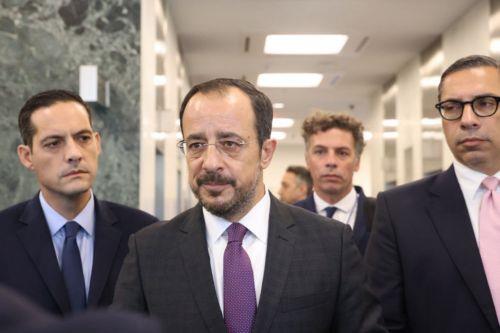With international law as the only tool in our quiver, Cyprus cannot be liberated, President Nikos Christodoulides said, speaking at an event of the federation of Cypriot American organisations in New York on Friday.
“In the current unregulated international system in which we operate, interests prevail over law and certainly not law over interests,” the President said.
In the context of the Cyprus problem, he pointed to the increased involvement of external parties including the European Union and the United Nations.
“We have achieved the reactivation of the international factor after seven years,” he said, referring to the previous meeting with Turkish Cypriot leader Ersin Tatar in Geneva in April and the upcoming meeting on Saturday evening in New York.
Christodoulides highlighted the importance of aligning the interest of “small Cyprus” with those of powerful states to show that the island “is not only the Cyprus problem”, but could offer support to important challenges in the wider region and areas of particular geostrategic importance, including the Middle East.
“We have shown in practice that our country is not part of the problem, but a provider of solutions, while at the same time demonstrating that we are a stable, predictable and reliable state in the region,” the President said.
He said that Cyprus had proven its role through initiatives such as the recent activation of the Amalthea plan, the maritime corridor for the provision of humanitarian aid to Gaza, and the Estia evacuation plan, which had been activated in the context of the escalations between Israel and Iran in June.
Speaking on Cyprus’s role in the international context, Christodoulides pointed to the island’s upcoming presidency of the European Council in 2026, saying one of the key aims would be to demonstrate that Cyprus could actively contribute to European integration and assert its presence as a committed and capable EU member state.
He also referred to the government’s recent meetings in New York, Texas, the Silicon Valley, and Canada, as part of an ongoing effort to attract investment interest.
At the same time, he acknowledged that economic strength was not just a matter of prosperity but of political resilience, noting that “an economically weak and vulnerable Republic of Cyprus is, as you understand, more vulnerable to any foreign pressure in relation to the Cyprus issue.”
“We must work to strengthen all the factors of power in our country,” he concluded, stressing that the resolution of the Cyprus problem remained the “number one priority.”






Click here to change your cookie preferences